He was aged just 15 when he became the youngest student of the University of Belgrade, a record he still holds to this day. Having become a doctor of historical sciences in his 30s, he has long been the director of the Institute of Contemporary History and the most popular professor at the Singidunum University Faculty of Media and Communications. The author of around a dozen books that interpret and explain, in an interesting way, some chapters of contemporary history, he is often invited as a guest in televised debates, as a reliable witness of the times. He is currently among the vice presidents of the Socialist Party of Serbia
Predrag J. Marković (1965) was born and raised in Belgrade, where he grew up as the middle child of three (he has an older sister, Danica, a professor at the Faculty of Veterinary Medicine in Belgrade, and a younger sister, Milena, a playwright who lectures at the Faculty of Dramatic Arts and won the NIN award for the novel Children, which the jury declared as being the best novel in Serbia in 2021).
Predrag J. Marković (1965) was born and raised in Belgrade, where he grew up as the middle child of three (he has an older sister, Danica, a professor at the Faculty of Veterinary Medicine in Belgrade, and a younger sister, Milena, a playwright who lectures at the Faculty of Dramatic Arts and won the NIN award for the novel Children, which the jury declared as being the best novel in Serbia in 2021).
“My family and childhood are among the best known imaginable. That’s because my sister Milena described our childhood in painful detail. She exposed the life of my family so much with that unusual novel that she wrote that I don’t know what I would add.”
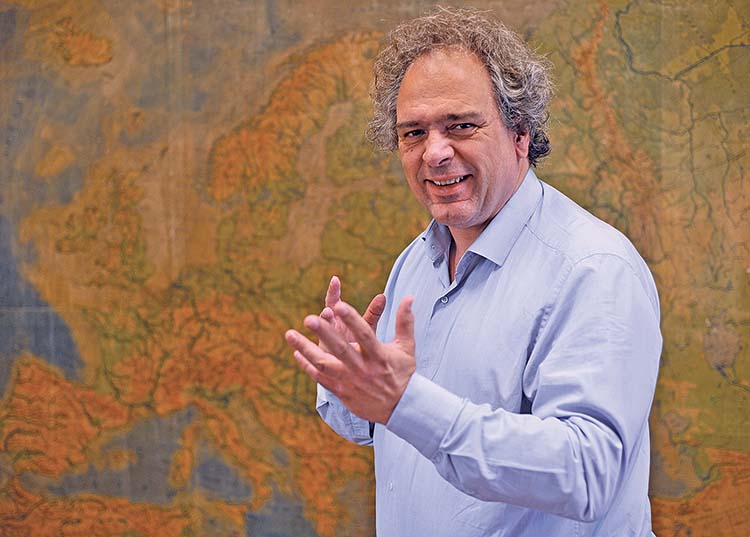
He describes his family as having belonged to the new socialist middle class. His father, Jovan, hails from a rural family, while his mother, Milka, was born into ‘the most terrible Lumpenproletariat family’, as he describes himself. His mother had a career as a Russian language teacher, while his father was, and remains, a devoted cinephile, screenwriter and the first private producer in Yugoslavia.
“I grew up in New Belgrade. None of my friends’ parents were from Belgrade. They were mostly lower ranked officers or employees in culture and various federal institutions… New Belgrade was no ghetto, which is also a lie. New Belgrade was a fortress of the socialist middle class. I only met upper echelon urban families for the first time when I married in old Belgrade, and they were really something different. There were several different types of middle class at that time, and I would divide them into at least two: the old middle class, as remnants of the pre-World War II period; and the new middle class raised under socialism.”
I went through the best course in modesty, because I was in big cities where nobody knew me. All budding youngsters should go to some bigger city to slightly temper their selfadoration
This historian cites numerous examples and scientific knowledge to show how much socialism created opportunities for education. He also exposes some misconceptions that still exist today when people talk about ‘old Belgrade families.’
“Only the elites leave tracks behind. What we know about those families we know from the books of Stevan Jakovljević, Svetlana Velmar Janković or Slobodan Selenić, and that is the very cream of the crop of several hundred families of the society of that time. And yet we know nothing about those families that lived in hovels, with an outdoor squat toilet behind their house. Most Belgraders lived in courtyard houses, with a drinking fountain in the yard and a squat toilet in the middle. And alongside it was obligatory to plant geraniums that would neutralise the stench.”
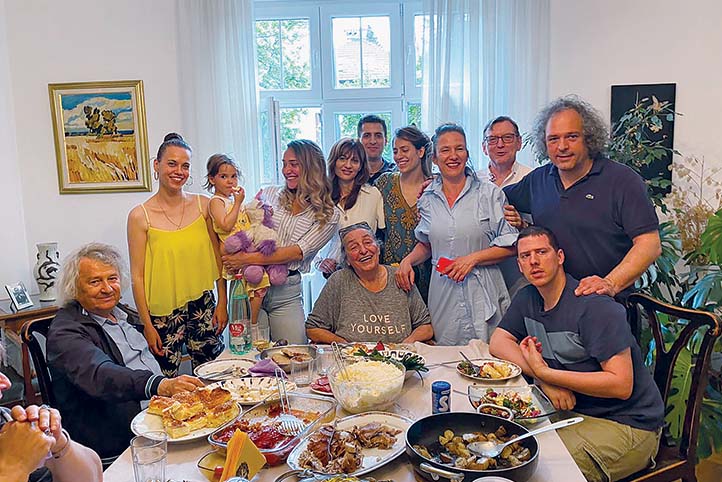
When it comes to the great fortunes made in the interwar period, and generally after every war, Marković says that they are war profiteers and that there hadn’t been many very wealthy people in the Kingdom of Serbia, as can be seen in the buildings erected at that time.
“Belgrade only ‘exploded’ in the 1920s and ‘30s, when a lot of money came into the city and many people got rich. And it seems that the most common investment was in buildings that yielded a return on the investment in five or six years, which was an incredible opportunity to generate wealth. The real boom began in 1918, with people constructing building after building, and Belgrade grew much more in the interwar period than it did after World War II.”
Predrag lectures in several subjects at Singidunum University’s Faculty of Media and Communications, and the ‘History of Family’ subject is one that also implies students talk to their grandmothers about their youth and life. And, according to him, grandmothers mostly lie. They describe what was not. They create an idyll that people want to believe in retroactively. Of course, there are families that raise children with better manners than others.
I increasingly believe that stupidity is one of the greatest forces in history; stupidity that is greater than any conspiracy. The problem with drawing lessons from history is that you don’t know which lesson to draw
“You also have that which psychologists call resilience, hardiness. Some children are like kittens – no matter how you throw them, they will land on their feet. Some children can survive any trauma and remain decent people. And some end up broken, like this demon child at Ribnikar” [in reference to the recent mass school shooting at Belgrade’s Vladislav Ribnikar Primary School].
He describes himself as having been an unhappy, frustrated teenager who resorted to the useful tactic of ‘fleeing upwards’. And that meant enrolling in college at the tender age of 15, after completing just the first year of high school. He insists that it wasn’t difficult. He figured that Lenin and some guy from Kopaonik who tended sheep had enrolled in university without having completed secondary school. He explains that it’s easy to pass entrance exams, but you have to try, which people don’t tend to do. He took seven subjects, which he found much easier than if he’d had to spent three more years sitting around in secondary school. He doesn’t see that as being something special, but rather considers himself as representing a continuation of the Marković family tradition.
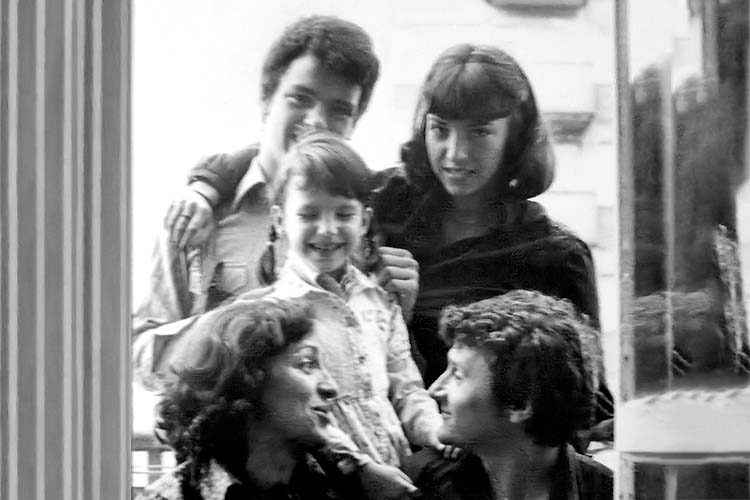
“My father, like every rural child, was left to his own devices, so he wandered around the village and sat down at a school desk at the age of five. Sitting in the classroom together were children from the first to the fourth grades, and he knew the answers to every question. He is thus the initiator of that schooling ahead of schedule, because he was a year and a half younger than his generation. And I perfected that method.”
Predrag is nine years older than his younger sister Milena, while Danica is 12 years her senior. The two elder siblings were thus like Milena’s second parents, even attending her school parents’ meetings and taking care of her.
“It seems that we underestimated her somewhat, as she was the youngest. When that great talent of hers manifested itself, things changed. My older sister and I now believe in Milena’s authority. She is actually the wisest of us. You see how a dynamic system it is; how relationships between people change constantly.”
Yugoslavia was an incredibly complicated country. More complicated than the Soviet Union. Not to mention Czechoslovakia. In Yugoslavia there were many similar sized nations, with terrible shared wounds. The Soviets didn’t have a tradition of fratricidal war like us
Women were the key to everything in the Marković family. Predrag was born as the lightest baby to survive at the time. He weighed just 900 grams. And he had hemiparesis, the partial loss of movement in one part of the body. His cousin, famous writer Dobrica Ćosić, managed to get hold of an incubator that wasn’t in Belgrade at the time and had to be brought from Zagreb. The doctors told his mother: ‘let go, you are a young woman, you’ll bear another child’. But Milka ignored them all, deciding that her son wouldn’t only survive, but that all his functions would also restore themselves. She was helped by Cvetko Brajović, a former Goli Otok inmate and one of the first speech therapists. It was Cvetko that gave him the name Predrag. The long and often torturous exercises that his mother took him for every day helped.
“I pulled through. Some consequences remained, but I lived a more or less normal life thanks to my mother’s fierce efforts. My mother was like a Šarplaninac [a devoted and stubborn mountain dog]. She would have jumped out of the window at a nod from my father. And she might even have asked if she was allowed to open it first. When you look at the stories of various successful people, you see the great importance of the role of mothers. Those were mothers in staunchly patriarchal societies who sacrificed everything for their children. Many successful children were raised on the sacrifice of their mothers.
“Fathers are today much better for their children than they once were. That was also noted, for example, by my favourite writer, Norwegian Karl Ove Knausgård, who – just like my sister Milena – described his life down to the most unpleasant details. He is a true Scandinavian father, looking after the children, feeding them, preparing their lunch and dinner. When he comes across Japanese tourists they take pictures of him, because that kind of emancipation has yet to arrive in Japan. You have that witty remark about Scandinavian crime shows, when the inspector comes home in the evening exhausted and has a glass of wine, while her husband has prepared dinner. Fortunately, that trend of caring fathers is expanding and today’s fathers are much more dedicated than father used to be. For instance, today you don’t have the model of a father who relaxes after work, after lunch, but rather one that takes care equal of the children as the mother.”
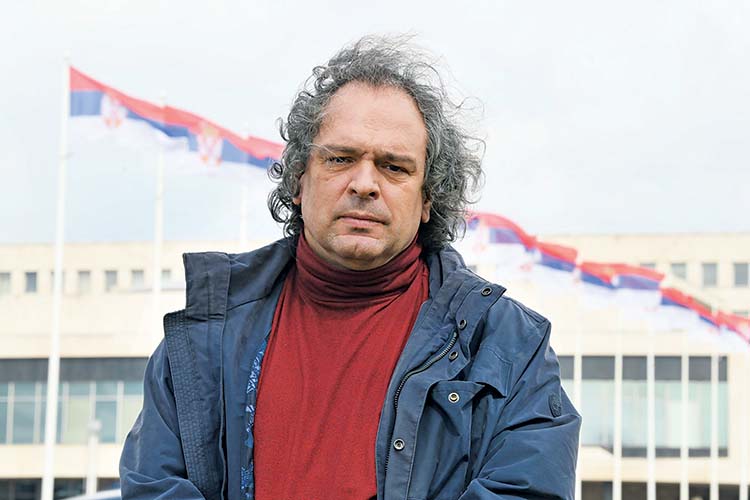
Vukan and Miona are the son and daughter of Predrag and Sara, and they are rightly proud of their children. Miona is a successful 27-year-old actress who is due to get married in a few months. Vukan is 29 and is completing his Ph.D. at Cambridge University. He didn’t want to be his daddy’s boy, so instead took the more difficult route of making his own way in a world where no one could help him in any way. And he succeeded in being true to himself, in dealing with what could be called the philosophy of history, something between philosophy and history. He works at the Institute for Philosophy and Social Theory.
“My children grew up in a patriarchal cooperative. I was a lodger residing with my in-laws, and that turned out well for the children. If anyone suffered, that was my wife. I lived like a student; my mother-in-law was a strict teacher of maths and my father-in-law was an extremely industrious man. They helped in raising the children to an incredible extent. The grandparents took them to school and waited for them afterwards, prepared lunch for them, and what was a frustrating situation turned out to be very good. When you are lucky enough to have grandparents who are interested in learning and are ambitious, that extended family doesn’t have to be a miserable solution. Thanks to some circumstances that were initially unfortunate, my family was more efficient in terms of educating the children than it would have been if I’d had a better living standard.
“Many cultures have shown extended families to be pretty effective. The middle generation goes to work and the older generation looks after the children. It can be seen in many cases that this network of grandparents doesn’t have a negative impact. You have the Chinese and the Vietnamese, among whom this principle of raising children functions well, and they are known as being the most successful people on the planet. In America, many of them are even more successful than the Jews!”
It was around a year ago that actress Miona Marković wrote a social media post dedicated to her mother Vladislava, who goes by the nickname of Sara, has been married to her father for three decades, works at the Belgrade City Library and successfully avoids the limelight. Her statements are touching: “My mum is a better parent to her parents than they ever were, and I won’t even mention us. My mother’s greatest success is us, her children, but she was never an ambitious parent. The success of her children was never a primary priority for her, and I guess that’s precisely why we wanted it. So, young parents, be like my mum, don’t pressure yourself or your children, they will find their own way to that which interests them.”
German diplomatic documents that have now been published show that Germany actually only broke when the war spread to the areas around Vukovar and Dubrovnik. Prior to that, both Germany and America were actually in favour of somehow preserving Yugoslavia. Attacking Dubrovnik and Vukovar was an unbelievably stupid decision
Our interlocutor says that its fortunate that everyone close to him does what they love.
“We are privileged people, several generations in the family do what they love. That is a combination of fortunate circumstances. Of course, in that there is also some work, talent, energy…”
There is one interesting detail from the biography of CorD’s interlocutor that is remembered by multiple generations. As a student, he was a winner in the most successful and popular Yugoslav TV quiz, “Kviskoteka”, which was broadcast by Television Zagreb. Speaking in 2017, the man who came up with that show concept and some other television quizzes, the late Lazo Goluža (1936-2020) said in 2017: “The greatest class in Kviskoteka was Belgrade history student Predrag Marković. May none of our people get angry, but that is the truth. He was phenomenal.”
Predrag gained enormous popularity across Yugoslavia during his time participating in this quiz, proving more popular even than the most famous stars of film and music of that time. He today talks about that time as a fond memory of Mr Goluža and presenter Oliver Mlakar (1935), with an explanation that’s seemingly inherent in him to provide justification whenever his successes are mentioned.
“That was in 1990, on the very eve of the war, and everything that happened prior to the war acquired an aura of nostalgia. You should know that that was a big country with just two television channels and so few programmes that everyone watched everything that was broadcast. The prize for Kviskoteka was a language course in Washington. And I also received a scholarship for England and was in London. So, I basically disappeared at the peak of my media popularity, spending more than six months in countries where I was nothing and nobody. I went through the best course in modesty, because I was in big cities where nobody knew me. All budding youngsters should go to some bigger city to temper their self-adoration.”
He recalls where he was when war broke out in Yugoslavia, and responds in the affirmative when asked if Yugoslavia really had to disintegrate.
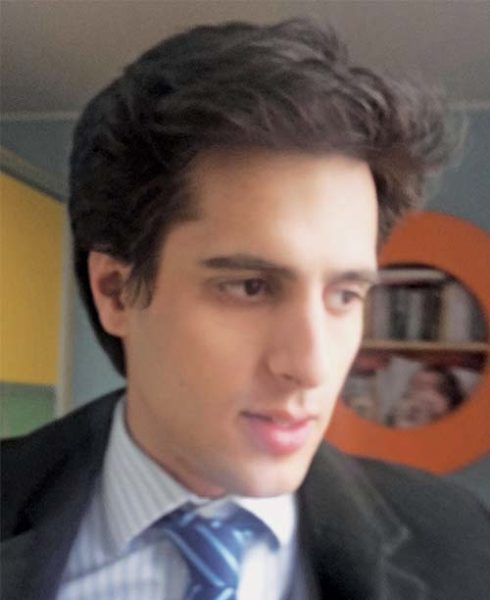
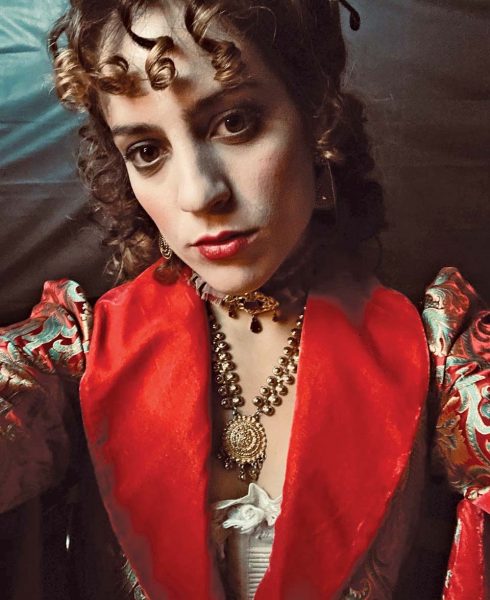
“It probably did have to, but it didn’t have to happen like that. Yugoslavia was an incredibly complicated country. More complicated than the Soviet Union. Not to mention Czechoslovakia. In Yugoslavia there were many similar sized nations, with terrible shared wounds. The Soviets didn’t have a tradition of fratricidal war like us. As a Srbijanac [meaning a Serb from Serbia], I knew nothing of the traumas that the Bosnian Serbs have. I saw that when the war erupted, because they couldn’t bear to live in a new NDH [a reference to the WWII Nazi puppet state of the Independent State of Croatia]. And that was obvious. Slavko Goldstein wrote about that in his book 1941: The Year That Keeps Returning. They restored the former name of the currency, restored the name of the army from the era of the Ustaše [WWII Croatian fascist and ultranationalist organisation], and the Croatian regime did nothing to appease the Serbs. Their ideal was obviously ‘Croatia without Serbs’, and that’s what they ultimately achieved.”
Many experts are of the opinion that Germany undoubtedly played a role in the collapse of the then Yugoslavia, which Marković explains in his capacity as a historian.
“That doesn’t seem to be entirely true. German diplomatic documents that have now been published show that Germany actually only broke when the war spread to the areas around Vukovar and Dubrovnik. Prior to that, both Germany and America were actually in favour of somehow preserving Yugoslavia. Attacking Dubrovnik and Vukovar was an unbelievably stupid decision. So many stupid moves were made that only the attack on Ukraine is stupider. You attack Dubrovnik, one of the world’s most beautiful cities, for no reason and that is unfortunately attributed to the Serbs, although it was assaulted by Montenegrins and the future darling of the Americans and the European Union, Milo Đukanović. And then you also attack Vukovar, that’s like Mariupol in Ukraine. You destroy a city with a national composition that’s actually predominantly Serbian.
Computer-based writing has made writing easier for various scribomaniacs. That is a worldwide trend. Something that was once mandatory isn’t any longer. You can now complete literature studies without reading Chekhov
“I increasingly believe that stupidity is one of the greatest forces in history; stupidity that is greater than any conspiracy. The problem with drawing lessons from history is that you don’t know which lesson to draw.”
As a professor at the Faculty of Media and Communications, he has the rare privilege and satisfaction of receiving the highest ratings among students year after year, and they enjoy attending his classes. He lectures on Media History, the History of Family, the History of Propaganda and Intercultural Communication. He says that he makes an effort around his students, because students love enthusiasts.
“I’ve had various experiences in teaching. I spent a long time going to Petnica [the Petnica Science Centre], which is attended by the best possible students, and I taught at the Teacher Education Faculty when the dean was Aleksandar Jovanović, a wonderful man. It was delightful to lecture at Petnica. Those are inquisitive children who write papers better than the majority of much older researchers. The most important pedagogical experience for me was represented by the lady teachers. Those are girls who don’t really have much love for history, because history is still preferred by men. I taught them in the evening slot, when they could hardly wait to go home, or to the dormitory, because most of them are from the heartlands. There I practiced all my skills to arouse interest among an audience that was completely indifferent to the subject.
“The practise is very different at the Faculty of Media and Communications. There is an overabundance of information on offer today and there are multiple canons. On the other hand, some canons that were valid for a long time have since been destroyed. For instance, the literary canon has been destroyed, the hierarchy of writers, and the fact is that more books are being sold than ever before. Today there are more copies in circulations and more titles. You could say that this is scribomania, as is the case in historiography. Computer-based writing has made writing easier for various scribomaniacs. That is a worldwide trend. Something that was once mandatory isn’t any longer. You can now complete literature studies without reading Chekhov.”
When it comes to his position as a vice president of the Socialist Party of Serbia, he says that party president Ivica Dačić utilised him very intelligently.
“He is a very wise man who allowed me to be a more or less independent intellectual, because it is better for people to simultaneously recognise the socialist and independent intellectual in me than for me to be some party soldier. And that gives me ample opportunity to primarily speak and interpret as a historian.
“My son taught me that, in history, the best story wins; the best told story leaves the strongest mark. The only problem is that there are a lot of stories.”